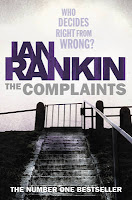 I'm nearing the end of Ian Rankin's, 'The Complaints'. I'll post my review early next week. Rankin, as per usual, has produced a solid, well plotted story that engages with a contemporary issue - in this case, the property crash in the wake of the financial crisis. And once again, there is a strong sense of place, with geography of Edinburgh shining through. That said, I found that I wasn't enjoying it as much as I thought I should. I'm a fan of Rankin's work and this seemed to have all the right ingredients. Then after a while it struck me - I either didn't like, or was ambivalent about, all the main characters. I had the same issue with John McFetridge's, 'Dirty Sweet'. A well written, well plotted story that featured morally ambiguous characters that I struggled to take a shine to (and I suspect I was never meant to; that was the point). It's an interesting approach, but as a reader it means there's no-one to identify with or to root for which, for me personally, leads to a slight alienation; a distancing or disconnection from the story.
I'm nearing the end of Ian Rankin's, 'The Complaints'. I'll post my review early next week. Rankin, as per usual, has produced a solid, well plotted story that engages with a contemporary issue - in this case, the property crash in the wake of the financial crisis. And once again, there is a strong sense of place, with geography of Edinburgh shining through. That said, I found that I wasn't enjoying it as much as I thought I should. I'm a fan of Rankin's work and this seemed to have all the right ingredients. Then after a while it struck me - I either didn't like, or was ambivalent about, all the main characters. I had the same issue with John McFetridge's, 'Dirty Sweet'. A well written, well plotted story that featured morally ambiguous characters that I struggled to take a shine to (and I suspect I was never meant to; that was the point). It's an interesting approach, but as a reader it means there's no-one to identify with or to root for which, for me personally, leads to a slight alienation; a distancing or disconnection from the story.Which brings me my question - does a story have to have at least one likeable character? A plucky hero, a lovable rogue, a flawed but moral maverick, etc. for it to work optimally? Or can all the characters be unlikeable and story still work just fine?
No comments:
Post a Comment